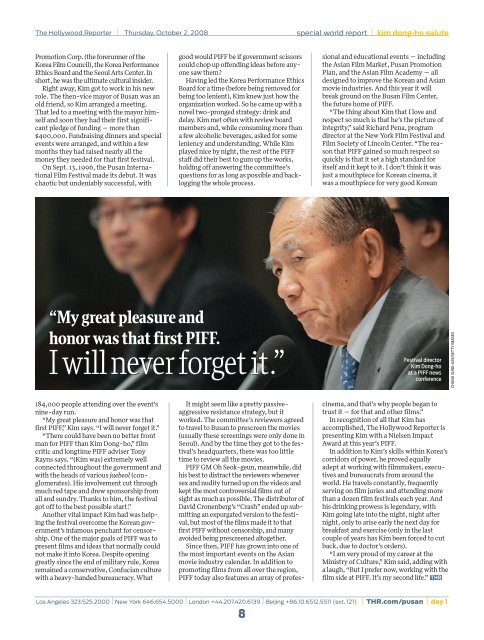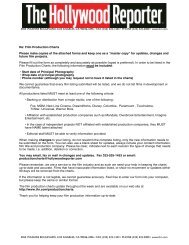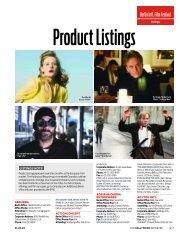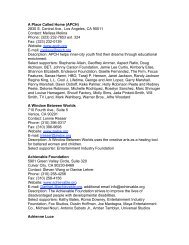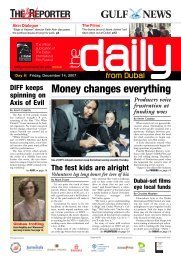Monday, October 2, 2008 - The Hollywood Reporter
Monday, October 2, 2008 - The Hollywood Reporter
Monday, October 2, 2008 - The Hollywood Reporter
You also want an ePaper? Increase the reach of your titles
YUMPU automatically turns print PDFs into web optimized ePapers that Google loves.
<strong>The</strong> <strong>Hollywood</strong> <strong>Reporter</strong> | Thursday, <strong>October</strong> 2, <strong>2008</strong> special world report | kim dong-ho salute<br />
Promotion Corp. (the forerunner of the<br />
Korea Film Council), the Korea Performance<br />
Ethics Board and the Seoul Arts Center. In<br />
short, he was the ultimate cultural insider.<br />
Right away, Kim got to work in his new<br />
role. <strong>The</strong> then-vice mayor of Busan was an<br />
old friend, so Kim arranged a meeting.<br />
That led to a meeting with the mayor himself<br />
and soon they had their first significant<br />
pledge of funding — more than<br />
$400,000. Fundraising dinners and special<br />
events were arranged, and within a few<br />
months they had raised nearly all the<br />
money they needed for that first festival.<br />
On Sept. 13, 1996, the Pusan International<br />
Film Festival made its debut. It was<br />
chaotic but undeniably successful, with<br />
184,000 people attending over the event’s<br />
nine-day run.<br />
“My great pleasure and honor was that<br />
first PIFF,” Kim says. “I will never forget it.”<br />
“<strong>The</strong>re could have been no better front<br />
man for PIFF than Kim Dong-ho,” film<br />
critic and longtime PIFF adviser Tony<br />
Rayns says. “(Kim was) extremely well<br />
connected throughout the government and<br />
with the heads of various jaebeol (conglomerates).<br />
His involvement cut through<br />
much red tape and drew sponsorship from<br />
all and sundry. Thanks to him, the festival<br />
got off to the best possible start.”<br />
Another vital impact Kim had was helping<br />
the festival overcome the Korean government’s<br />
infamous penchant for censorship.<br />
One of the major goals of PIFF was to<br />
present films and ideas that normally could<br />
not make it into Korea. Despite opening<br />
greatly since the end of military rule, Korea<br />
remained a conservative, Confucian culture<br />
with a heavy-handed bureaucracy. What<br />
good would PIFF be if government scissors<br />
could chop up offending ideas before anyone<br />
saw them?<br />
Having led the Korea Performance Ethics<br />
Board for a time (before being removed for<br />
being too lenient), Kim knew just how the<br />
organization worked. So he came up with a<br />
novel two-pronged strategy: drink and<br />
delay. Kim met often with review board<br />
members and, while consuming more than<br />
a few alcoholic beverages, asked for some<br />
leniency and understanding. While Kim<br />
played nice by night, the rest of the PIFF<br />
staff did their best to gum up the works,<br />
holding off answering the committee’s<br />
questions for as long as possible and backlogging<br />
the whole process.<br />
“My great pleasure and<br />
honor was that first PIFF.<br />
I will never forget it.” CHUNG<br />
It might seem like a pretty passiveaggressive<br />
resistance strategy, but it<br />
worked. <strong>The</strong> committee’s reviewers agreed<br />
to travel to Busan to prescreen the movies<br />
(usually these screenings were only done in<br />
Seoul). And by the time they got to the festival’s<br />
headquarters, there was too little<br />
time to review all the movies.<br />
PIFF GM Oh Seok-geun, meanwhile, did<br />
his best to distract the reviewers whenever<br />
sex and nudity turned up on the videos and<br />
kept the most controversial films out of<br />
sight as much as possible. <strong>The</strong> distributor of<br />
David Cronenberg’s “Crash” ended up submitting<br />
an expurgated version to the festival,<br />
but most of the films made it to that<br />
first PIFF without censorship, and many<br />
avoided being prescreened altogether.<br />
Since then, PIFF has grown into one of<br />
the most important events on the Asian<br />
movie industry calendar. In addition to<br />
promoting films from all over the region,<br />
PIFF today also features an array of profes-<br />
sional and educational events — including<br />
the Asian Film Market, Pusan Promotion<br />
Plan, and the Asian Film Academy — all<br />
designed to improve the Korean and Asian<br />
movie industries. And this year it will<br />
break ground on the Busan Film Center,<br />
the future home of PIFF.<br />
“<strong>The</strong> thing about Kim that I love and<br />
respect so much is that he’s the picture of<br />
integrity,” said Richard Pena, program<br />
director at the New York Film Festival and<br />
Film Society of Lincoln Center. “<strong>The</strong> reason<br />
that PIFF gained so much respect so<br />
quickly is that it set a high standard for<br />
itself and it kept to it. I don’t think it was<br />
just a mouthpiece for Korean cinema, it<br />
was a mouthpiece for very good Korean<br />
Festival director<br />
Kim Dong-ho<br />
at a PIFF news<br />
conference<br />
cinema, and that’s why people began to<br />
trust it — for that and other films.”<br />
In recognition of all that Kim has<br />
accomplished, <strong>The</strong> <strong>Hollywood</strong> <strong>Reporter</strong> is<br />
presenting Kim with a Nielsen Impact<br />
Award at this year’s PIFF.<br />
In addition to Kim’s skills within Korea’s<br />
corridors of power, he proved equally<br />
adept at working with filmmakers, executives<br />
and bureaucrats from around the<br />
world. He travels constantly, frequently<br />
serving on film juries and attending more<br />
than a dozen film festivals each year. And<br />
his drinking prowess is legendary, with<br />
Kim going late into the night, night after<br />
night, only to arise early the next day for<br />
breakfast and exercise (only in the last<br />
couple of years has Kim been forced to cut<br />
back, due to doctor’s orders).<br />
“I am very proud of my career at the<br />
Ministry of Culture,” Kim said, adding with<br />
a laugh, “But I prefer now, working with the<br />
film side at PIFF. It’s my second life.” ∂<br />
Los Angeles 323.525.2000 | New York 646.654.5000 | London +44.207.420.6139 | Beijing +86.10.6512.5511 (ext. 121) | THR.com/pusan | day 1<br />
8<br />
SUNG-JUN/GETTY IMAGES


